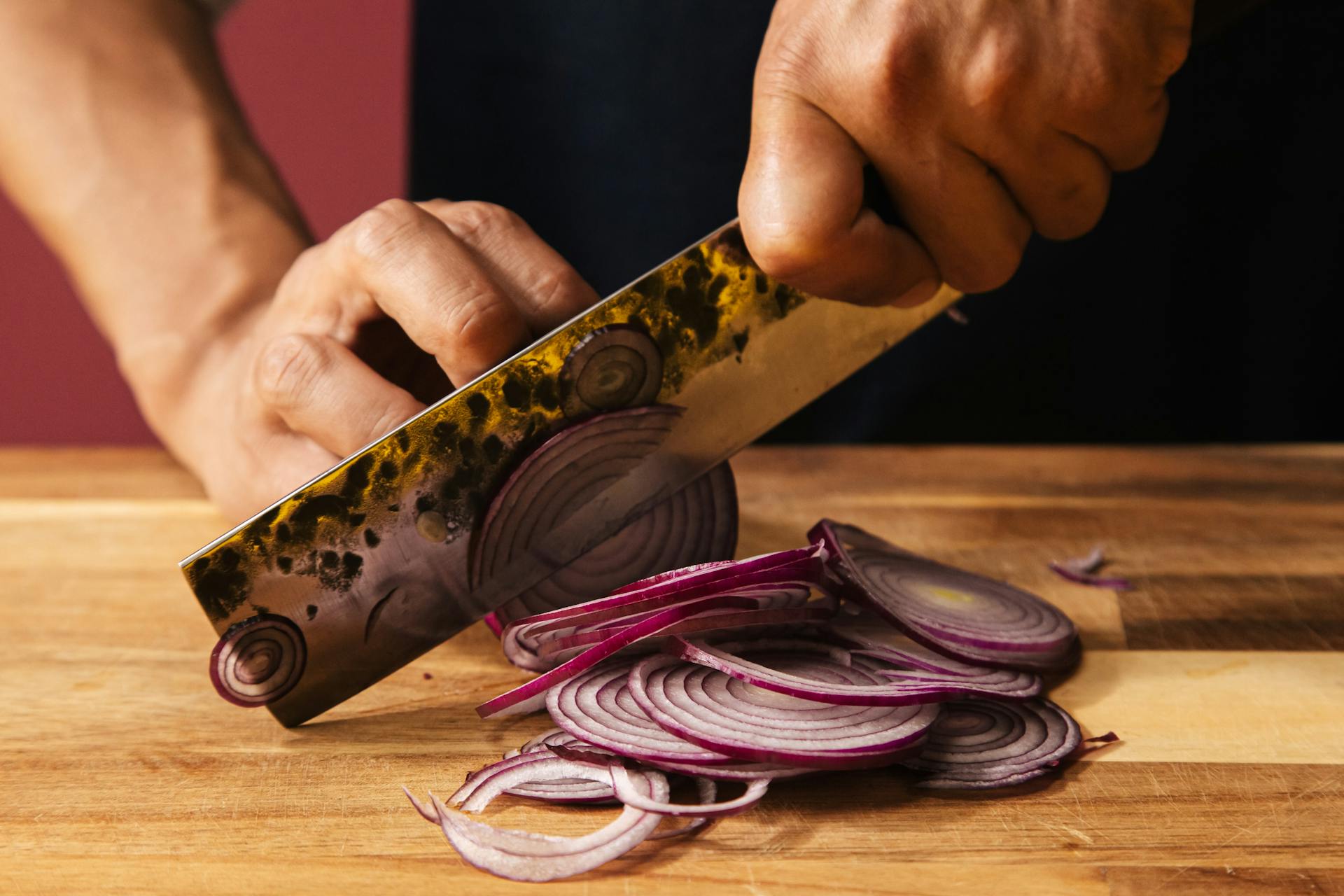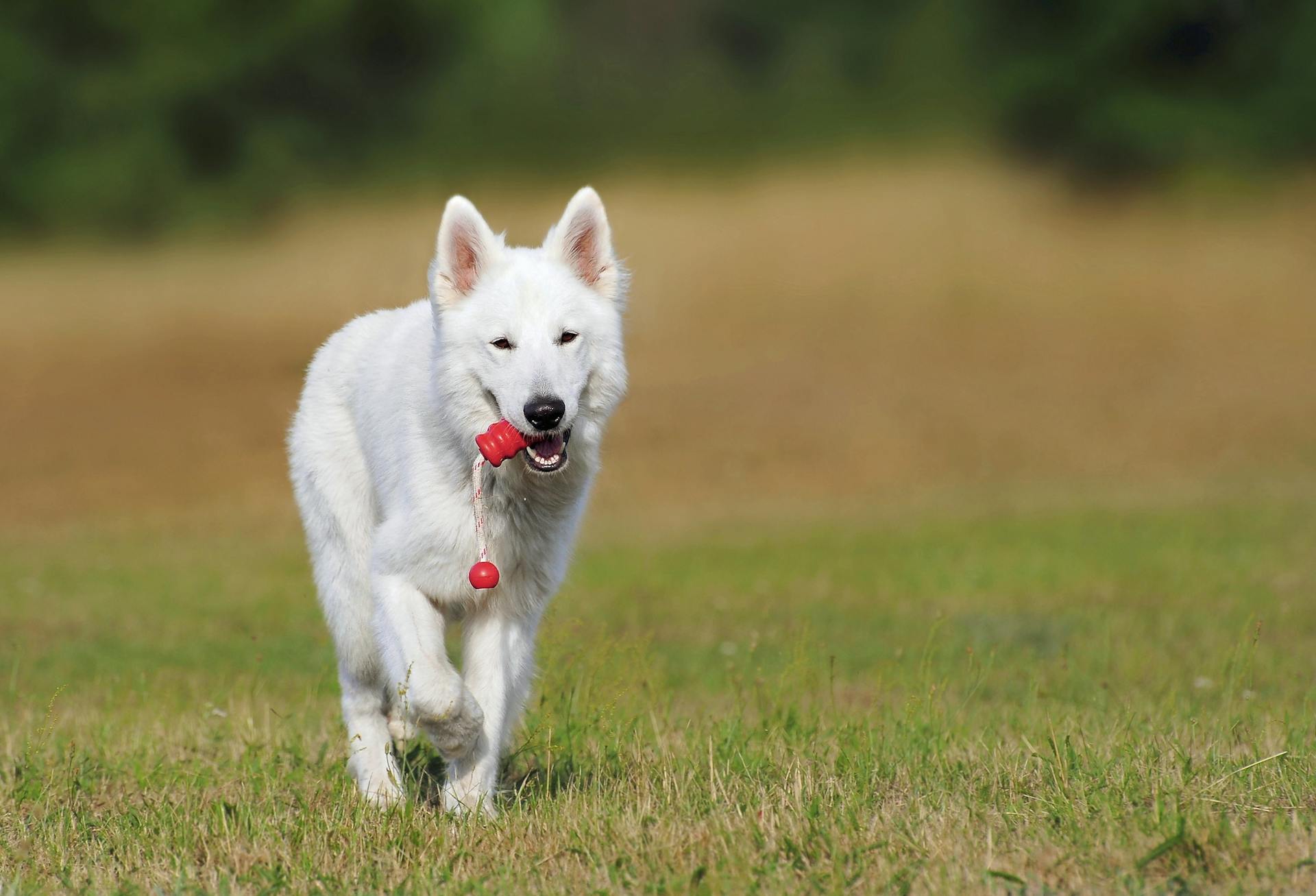
If you've ever accidentally left a small amount of onion on the kitchen counter, you might be wondering if it's safe to let your dog sniff or lick it. The truth is, a small amount of onion might not seem like a big deal, but it can still cause some issues for your furry friend.
Onions belong to the Allium family, which also includes garlic and leeks. These plants contain a compound called N-propyl disulfide, a toxic substance that can cause damage to your dog's red blood cells. Even a small amount can be problematic.
In fact, the American Kennel Club recommends that you keep all Allium plants out of reach of your dog, as even small amounts can lead to anemia and other health problems. So, if you've got a curious pup, it's best to keep the onions and garlic out of sight.
If your dog does ingest a small amount of onion, it's essential to monitor their behavior and health closely.
You might like: How to Keep Dogs from Eating Plants
Poison
Onions are toxic to dogs, but only in certain amounts. If your dog ate a small amount of onion, the risk of harm is lower, but it's still essential to monitor their behavior.
The toxicity of onion poisoning in dogs is related to the concentration and types of organosulfoxides in the plant. The stronger the flavor or odor, the more toxic it is.
Eating garlic is more toxic to dogs than onions, with garlic being 3-5 times more potent. This is because garlic has a more concentrated state of toxic compounds.
The clinical illness from onion poisoning in dogs only occurs when the destruction of red blood cells surpasses the body's capacity to recover and repair itself, which typically happens 3-5 days after ingestion.
Symptoms of onion toxicity might include vomiting, diarrhea, lethargy, lack of appetite, abdominal pain, pale gums, weakness, elevated heart rate, discolored urine, and collapse.
If your dog has eaten onions in the last hour or so, the vet will induce vomiting to remove any leftover onions from the stomach and administer activated charcoal to bind any remaining toxins.
If the onion has already been absorbed and the toxin has reached the bloodstream, there is no antidote available, and the dog will require daily monitoring through blood lab tests, control of anemia, and a diet high in iron to support recovery.
If this caught your attention, see: How Much Onion Is Toxic to a Dog
Safe Consumption Guidelines
A small amount of onion is still a concern for your dog's health. It's best to avoid giving your dog onions altogether.
For a safe consumption guideline, consider this: up to 0.5% of your dog's body weight is typically safe. However, this can vary depending on the size of your dog and the amount of onion eaten.
A 45-pound dog, for example, would only need to eat one medium-to-large onion to potentially experience onion poisoning.
If this caught your attention, see: Can You Hurt a Dog's Feelings?
How Much Is It?
A toxic dose of onion for dogs is considered to be more than 0.5% of a dog's body weight.
This means a small amount can be toxic, especially for larger dogs. For example, a 45-pound dog would only have to eat one medium-to-large onion to potentially experience onion poisoning.
It only takes 100 grams of onion, about the size of a medium onion, per 20 kilograms of a dog's weight to cause toxic effects.
The amount of onion that's toxic to dogs is surprisingly small, so it's essential to keep onions out of reach of your furry friends.
See what others are reading: Is Plant Food Toxic to Dogs
How Much Can a Dog Safely Eat?
Onions are typically safe for up to 0.5% of a dog's body weight. This means if your dog weighs 20 kilograms, they can safely eat about 100 grams of onion.
The size of the dog in question is a crucial factor when determining safe consumption. If your dog is on the larger side, they may need to stick to a much smaller amount.
Even a small amount of onion can be toxic if eaten regularly over a long period of time. So, if your dog is a regular snacker, it's best to keep onions out of reach.
A 45-pound dog would only have to eat one medium-to-large onion to potentially experience onion poisoning. That's a lot of onion in one sitting!
If you suspect your dog has eaten onions, it's always best to err on the side of caution and monitor them for symptoms.
For another approach, see: Ant Poison Dog Safe
Prevention and Prevention
To prevent onion toxicity in dogs, the most effective way is to simply avoid feeding them onion and garlic products altogether. This includes table scraps and human food.
Make sure to properly dispose of any onion or garlic pieces that your dog might find on the floor, as even small amounts can be toxic.
Some over-the-counter flea preventatives contain Allium-based ingredients, which should be avoided to keep your dog safe.
What is Considered?

A small dog weighing 20 pounds is generally safe if they consume up to ¼ of a cup of onions.
The amount of onion considered toxic varies depending on the dog's size and weight.
For an 80-pound labrador, a cup of onions is considered non-toxic.
Onions can be toxic to dogs if they eat too much, but the exact amount depends on the dog's size and weight.
Broaden your view: Does Blowing in a Dog's Face Hurt Them?
Can Be Prevented?
Prevention is key. To prevent onion toxicity in dogs, it's essential to avoid feeding them onion and garlic products altogether.
Make sure to dispose of any onion or garlic pieces that your dog might find on the floor, as these can be toxic. This includes onion powder or dried onion flakes.
Some over-the-counter flea preventatives may contain Allium-based ingredients, so it's best to avoid these products.
Cooking and Preparation
Cooked onion is still toxic to dogs, as the heat doesn't break down the compounds that cause onion toxicity. This means that even a small amount of cooked onion can be harmful to your dog.
In some cases, cooking can actually increase the toxic compounds found in onions and garlic, making them even more hazardous to your pet's health.
Can Eat Powder?

Can Dogs Eat Powder?
Parents shouldn't give their dog any food that contains onion powder, as it's a concentrated form that can be even more toxic than fresh onions.
Onion powder is a common kitchen ingredient that can be easily overlooked, but it's essential to store it safely out of reach of dogs to avoid any potential harm.
If you're using onion powder in the kitchen, be sure to clean up any spills straight away to prevent your dog from getting into it.
If this caught your attention, see: Dog Ate Onion Powder
How Are Cooked?
Cooked onions are still toxic to dogs, as the heat doesn't break down the compounds that cause onion toxicity.
Cooking can actually increase the toxic compounds found in Allium vegetables like onions and garlic, making them even more hazardous for your furry friend.
It's essential to avoid feeding cooked onions to your dog, as it can lead to severe consequences, including gastrointestinal and anemia-related symptoms.
If your dog has ingested cooked onions, seek medical attention immediately for the best prognosis.
Dog Health and Symptoms
If your dog eats a small amount of onion, you may not need to worry, but it's essential to keep an eye on them. The amount of onion that's toxic to dogs depends on their size, and a minimal amount in a large dog might not cause harm.
Symptoms of onion toxicity can be subtle, but it's crucial to look for them. If your dog is vomiting, has diarrhea, or is lethargic, it could be a sign that they've eaten too much onion.
Here are some common symptoms to watch out for:
- Diarrhea
- Vomiting
- Lethargy
- Mouth irritation
- Panting too much
- Collapsing
- Sensitive stomach
- Reddish urine
- Weakness
- Pale gums
If you're unsure how much onion your dog ate or if it was more than 0.5% of their body weight, it's always best to err on the side of caution and take them to the vet.
Dog Symptoms
If your dog has eaten onions, it's essential to look out for symptoms that could indicate onion toxicity. Diarrhea, vomiting, lethargy, and mouth irritation are all potential signs to watch for.
Be aware that these symptoms can be subtle, so it's crucial to keep a close eye on your dog, especially if you're unsure how much they ate. If you know they ate more than 0.5% of their body weight in onions, seek veterinary attention immediately.
Some common symptoms of onion poisoning in dogs include vomiting, diarrhea, lethargy, and a lack of appetite. Abdominal pain is also a possible symptom.
If your dog is showing any of these symptoms, it's essential to monitor their condition closely. Pale gums, weakness, and an elevated heart rate are all potential signs that your dog is suffering from onion toxicity.
Here are some key symptoms to watch for:
- Diarrhea
- Vomiting
- Lethargy
- Mouth irritation
- Panting too much
- Collapsing
- Sensitive stomach
- Reddish urine
- Weakness
- Pale gums
In severe cases, onion poisoning can lead to collapse. If you suspect your dog has eaten onions, don't hesitate to seek veterinary attention.
What Is the Prognosis?
The prognosis for your furry friend depends on several factors, and it's essential to know what to expect. The success of treatment for onion toxicity in dogs is determined by the amount consumed.
If your dog has ingested onions, it's crucial to get them treated as soon as possible. Their current anemia levels play a significant role in determining the outcome of treatment.
The sooner treatment begins after ingestion, the better the chances of a successful outcome.
How Long to Watch My Dog?
If your dog has eaten onions, it's crucial to keep a close eye on them in the hours that follow.
You should monitor your dog in the hours after eating the onions.
Dog Food Consumption
Onions are toxic to dogs, but only in certain amounts. If your dog has eaten onions, it's crucial to determine how much they consumed.
A small dog that ate a larger amount of onions might need to schedule an emergency vet visit. This is especially true if your dog is already showing symptoms of onion toxicity.
Keep in mind that onions are toxic to dogs, but only in certain amounts. If your dog is a large breed and only ate a minimal amount of onion, you may not need to do anything other than keep an eye on them.
Monitoring your dog's behavior and watching for symptoms is key. If you notice any unusual behavior, such as vomiting or diarrhea, seek veterinary attention right away.
For another approach, see: Do Small Dogs Need Small Breed Food
Frequently Asked Questions
How much onion is toxic to a 10 lb dog?
For a 10-pound dog, eating over 4 teaspoons of onions can be toxic. Dehydrated onions are a bigger concern due to their higher concentration.
How long are dogs sick onions?
Onion toxicity in dogs can cause symptoms within 1-7 days after ingestion, depending on the dose. If ingested in large amounts, dogs can become severely ill in as little as 24 hours
How much scallion is toxic to dogs?
Toxicity from scallions typically occurs at doses above 15-30 g/kg of body weight, which is a relatively large amount for a dog to ingest. If you suspect your dog has eaten scallions, it's essential to monitor their health closely and seek veterinary attention if you notice any adverse symptoms.
What foods are toxic to dogs?
Dogs should avoid eating foods containing toxic substances like chocolate, Xylitol, chives, and certain seeds and pits, which can cause serious harm or even death. If you suspect your dog has ingested something toxic, seek veterinary attention immediately
What if my dog ate onion rings?
If your dog eats onion rings, seek immediate veterinary care or call the Pet Poison Helpline at 800-213-6680
Sources
Featured Images: pexels.com


